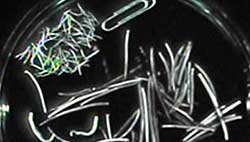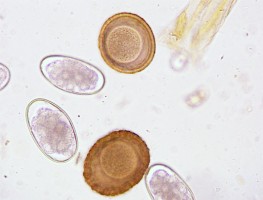Horses: Strongyles & Ascarids
The Main Equine Worms Detected in a Faecal Egg Count (FEC) Test – Strongyle and Ascarid Eggs
FECs enable you to determine the numbers of eggs of the most common and pathogenic (disease-causing) intestinal parasites in the faeces of your horse. These are the strongyles in mature horses and ascarids (Parascaris equorum) in foals. Both strongyles and ascarids are nematodes.

The strongyles include the small strongyles and large strongyles. The small strongyles, also known as cyathostomins, comprise many species (>40 in horses, although only about 12 are common). They are the most important parasite of mature horses, both in terms of numbers and their ability to cause disease. They cause diarrhoea, weight loss and even fatal disease. Their eggs account for the majority (about 75-100%, often near 100%) of eggs in the faeces of mature horses. The large strongyles cause severe colic, arterial blood clots, intestinal damage and death, but are generally rare in managed horses today.

Ascarids are very common in foals and yearlings but generally not a problem in horses > 15- 24 months of age because horses of this age have usually developed excellent immunity to them. They cause impactions and/or perforations of the small intestine, as well as weight loss and diarrhoea.
